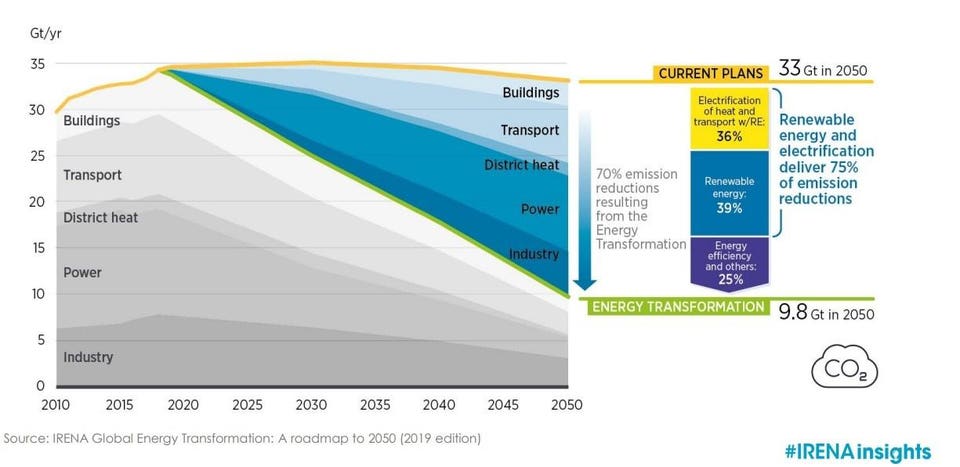Forbes Innovation Sustainability Is Energy Efficiency our Panacea for Power? Saleem H. Ali Contributor Opinions expressed by Forbes Contributors are their own. Environmental systems scientist at the University of Delaware Following Oct 29, 2023, 06:23pm EDT | Press play to listen to this article! Got it! Share to Facebook Share to Twitter Share to Linkedin Plausible pathway to a green energy transition? Efficiency is a major part of the solution but .
. . [+] uncertainties on the material-energy nexus for delivering other key infrastructure remain.
International Renewable Energy agency IRENA (Creative Commons License Image) Princeton University’s Andlinger Center for Energy and the Environment hosted their annual meeting on October 27th with an informative and entertaining keynote by Amory Lovins, founder of the Rocky Mountain Institute (RMI) and on the adjunct faculty of Stanford’s newly endowed Doerr School of Sustainability. Mr. Lovins, who is a MacArthur Fellow , was introduced by Dr.
Barry Rand, who heads external relations for the center, as the “Einstein of Energy Efficiency. ” In his presentation, the take-home message from Mr. Lovins was that we neither need massive sources of baseload power such as nuclear energy or massive battery storage for renewable energy infrastructure to meet our energy needs for the foreseeable future.
Instead, we need a smart transition to energy efficiency and a more robust interlocked grid which is able to act as backup for baseload power. Furthermore, Mr. Lovins also suggested that carbon capture and storage and other forms of engineered “decarbonization” were largely unnecessary as well because a much faster transition away from fossil fuels was possible.
Professor Emily Carter, who has the rare distinction of being a member both the National Academy of Sciences and the National Academy of Engineering , as well as the National Academy of Inventors , chaired a panel which gently challenged some of these assumptions. Her insights are informed in part by a major committee she is chairing for the Academies . Even if efficiency and a greener transition are possible by an upscaling of RMI’s approaches, it may still not be probable, given the enormous constraints we have in terms of global environmental governance.
For example, the landmark report published by Mr. Lovins and associates at the Rocky Mountain Institute titled Reinventing Fire, convincingly makes a case for his proposed win-win efficiency and renewables transition pathway but has embedded assumptions that might not be realizable. Many of the arguments around renewables uptake and grid infrastructure, neglect the material-energy nexus research that has been undertaken on criticality of metals needed for transition.
Mr. Lovins has dismissed concerns about exotic minerals for batteries and wind turbines, but a lot of the criticality concerns pertain to base metals like copper. Furthermore, efficient grid delivery can help to some degree with baseload power, but we will still need batteries for transport infrastructure.
Finally, there is the lingering concern about the “rebound effect” or Jevon’s paradox that suggests that one may get higher consumption of resources with improved efficiency if we lose track of aggregate consumption. Concerns about the rebound effect also exist for a circular economy, where consumers may get signaling to consume more if they feel the economy is more “sustainable,” thereby negating the efficiency dividends. Mr.
Lovins again dismissed concerns about the rebound effect, noting convincingly that the evidence of such effects has thus far been minimal for major efficiency payoffs. Nevertheless, the literature has many gaps as a recent review on the topic concluded and we need to always keep track of total consumption, especially when we have so many in the Global South being driven to emulate Northern lifestyles through advertising. Energy efficiency and a relatively less painless transition towards a lower carbon future are perhaps within our reach, but in a world of suboptimal decision-making we cannot be complacent that the best paths will be chosen.
Furthermore, research on multiple new energy sources such as geological hydrogen or nuclear fusion will provide us with a broader range of opportunity sets if the material-energy nexus becomes a constraint in specific pathways for renewables. We are at an exciting moment in the Anthropocene where a systems perspective on energy is being embraced by eminent research institutes, and consumers are becoming more informed about their resource usage decisions. Embracing efficiency is a first but not the final step to securing our future.
MORE FOR YOU Magic Johnson Is Now A Billionaire Hollywood Reacts Friends Star Matthew Perry Dead At 54 Matthew Perry Dead: The ‘Friends’ Star Was 54 Follow me on Twitter or LinkedIn . Saleem H. Ali Editorial Standards Print Reprints & Permissions.
From: forbes
URL: https://www.forbes.com/sites/saleemali/2023/10/29/is-energy-efficiency-our-panacea-for-power/



